Search Results
Showing results 201 to 220 of 431
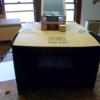
Cardboard Box Camera Obscura
Source Institutions
In this activity, learners construct a device that projects images onto a surface, so they can trace landscapes and other sights.

Soggy Science, Shaken Beans
Source Institutions
Learners explore soybeans, soak them in water to remove their coat, and then split them open to look inside. They also make a musical shaker out of paper cups, a cardboard tube, and soybeans.
Building Houses: Build a Cardboard Tube House
Source Institutions
Build a house you can fit inside, using cardboard tubes.
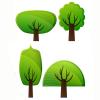
Give or Take?
Source Institutions
In this outdoor activity, learners work in pairs using their senses—especially touch—to learn more about individual trees.
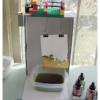
Overnight Painting Machine: Pico Cricket Activity
Source Institutions
This activity requires a Pico Cricket (tiny computer).
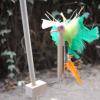
Woodpecker
Source Institutions
In this activity, learners construct a traditional handicraft toy that illustrates a motion commonly associated with violins and earthquakes.
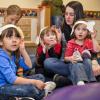
Horton Senses Something Small
Source Institutions
In this story time program, young learners listen to the Dr.
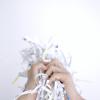
Recycling Paper
Source Institutions
In this crafty chemistry activity (on page 2 of the PDF), learners make their own paper from used paper they may have otherwise thrown away.
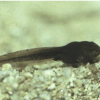
Life Story
Source Institutions
In this two-part activity, learners compare and contrast a variety of life cycles to better understand different organisms and how they develop.
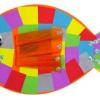
Design-a-Fish
Source Institutions
In this science and language arts activity, learners study fish anatomy and make their very own 3D paper fish.
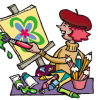
Paint a Fresco
Source Institutions
In this activity on page 7 of the PDF, learners experiment with the interesting designs that can be made by painting on plaster.
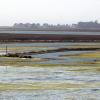
Wetland Preservation Art
Source Institutions
In this hands-on art and science activity (page 4 of the pdf), learners brainstorm and discuss how humans use wetlands, then express their understanding of the subject in artwork.
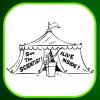
The Face of Science
Source Institutions
Learners draw pictures of how they envision scientists. By comparing and discussing the features in their pictures, they can discover common thoughts and stereotypes about scientists.
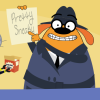
Operation Espionage
Source Institutions
In this activity, learners create and reveal secret messages written with invisible ink! The invisible ink is actually a baking soda solution, and the magical revealing liquid is fruit juice.
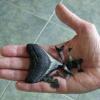
Chomp
Source Institutions
In this activity (page 5 of pdf), learners explore the relationships between the shape and structure of a shark's teeth and the food it eats, and then create their own shark tooth from clay.
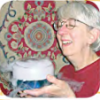
Homework, Hogwarts Style
Source Institutions
In this activity on page 8 of the PDF (Behind the Scenes with Chemistry), learners make three of Harry Potter's essential school supplies: quills, ink, and color-changing paper.
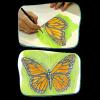
Draw a Monarch Butterfly: Scientific Illustration
Source Institutions
Ivy Rutzky, a scientific assistant at the American Museum of Natural History, introduces an activity where learners create a scientific illustration of a monarch butterfly.
Press Seaweed
Source Institutions
In this activity, learners will collect, dry and press seaweed over the course of four days in a similar way that artists/crafters press flowers.
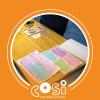
Watercolor
Source Institutions
In this activity, learners will use chemistry to create a night sky watercolor painting. They will experiment to learn the effects of mixing crayon, salt, and lemon juice with water color paints.
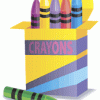
Resistance is Useful
Source Institutions
Learners write or draw with white crayon on white paper. They look and feel to detect their marks on the paper. Then, learners paint over their paper with watercolor paint.
